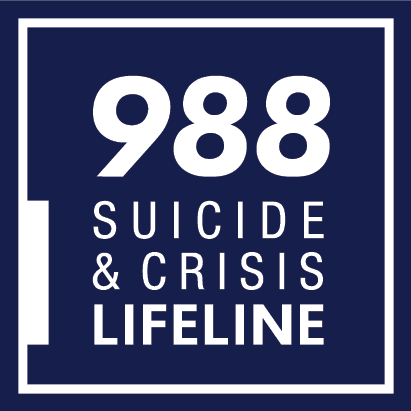Answers To Frequently-Asked Questions
Frequently-Asked Questions
Calling the 988 Lifeline connects you with someone who can discuss your situation and empower you to help your friend, family member, or loved one. The following are common questions we get asked about the program and what to expect when you call.
What is mental health?
Mental health refers to your overall sense of emotional and psychological well-being, and describes how your thoughts, emotions, and behaviors influence your abilities to handle stress, form relationships with others, and make decisions.
What causes mental health issues?
Many factors can affect your sense of well-being, including stressful situations, emotional loss and grief, inherited genetic traits, or even an imbalance in your brain chemistry. Many mental health issues develop over time and may go undetected until a crisis situation occurs.
What do I do if I am suffering from a mental health issue?
Try talking to a loved one such as a friend or family member, or seek out professional help to discuss your thoughts and emotions. If you’re feeling desperate, lost, or have no one else to turn to, you can always call 988 to connect immediately with someone who will listen to you without judgment and help you sort things out.
What is 988?
The 988 Lifeline is the starting point of a crisis care response that begins with you contacting 988 by phone, text, or chat. We’re here to assist you in an emergency situation, and then—once you’re safe and stable—we can quickly refer you to responders or other local resources who can help you deal with your situation.
Do I have to be suicidal to call 988?
What can I do to help my loved one?
Try talking to them in a calm, non-judgmental way, be supportive and encourage them to seek professional help, and check in with them often to make sure things are not getting worse.
How do I comfort someone in crisis?
It is important to listen openly, express understanding and concern, and offer to help them look for resources and/or professional help. If you fear your loved one may hurt themselves or someone else, then call 988 immediately for help.
What are the signs of suicidal behavior?
Is it safe to talk to someone about suicide?
Yes. There is a misconception that discussing suicide with a loved one who is struggling might “put the thought into their head,” but doing so actually creates an opportunity for communication and decreases the chance that your loved one will make an impulsive decision to hurt themselves.
How can the 988 Lifeline help?
In an emergency situation, we can talk directly to your loved one experiencing a mental health crisis, or we can talk you through how to assist someone experiencing suicidal thoughts. 988 is part of a continuum of mental health care that includes sharing resources that could include a
mental health mobile crisis and crisis stabilization units. We can refer you to other resources that provide specific, long-term help to those in need.
Resources
Visit our Resources page to discover other local mental health resources that may be able to help you or your loved one.







